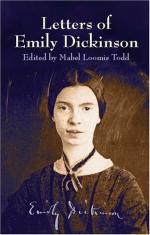|
This section contains 10,505 words (approx. 36 pages at 300 words per page) |

|
SOURCE: "'The Wildest Word': The Habit of Renunciation," in Dickinson: Strategies of Limitation, University of Massachusetts Press, 1985, pp. 21-46.
In the following essay, Eberwein examines the theme of renunciation in Dickinson's love poems, suggesting the possible correlation between certain life experiences and Dickinson's verse.
"Dont you know you are happiest while I withhold and not confer—dont you know that 'No' is the wildest word we consign to Language?" (L 562). Dickinson posed these questions in an 1878 letter to Judge Otis Phillips Lord at an early stage in her autumnal romance with the widowed Salem jurist, her father's friend and ally in Massachusetts Whig politics. They exemplify a pattern of thinking that had come to characterize her over the years: a habit of renunciation, an excitement in denial, a preference for restrictions. Notions about Emily Dickinson's pitifully deprived life originated in her biography itself; the deprivation was there (mostly...
|
This section contains 10,505 words (approx. 36 pages at 300 words per page) |

|


